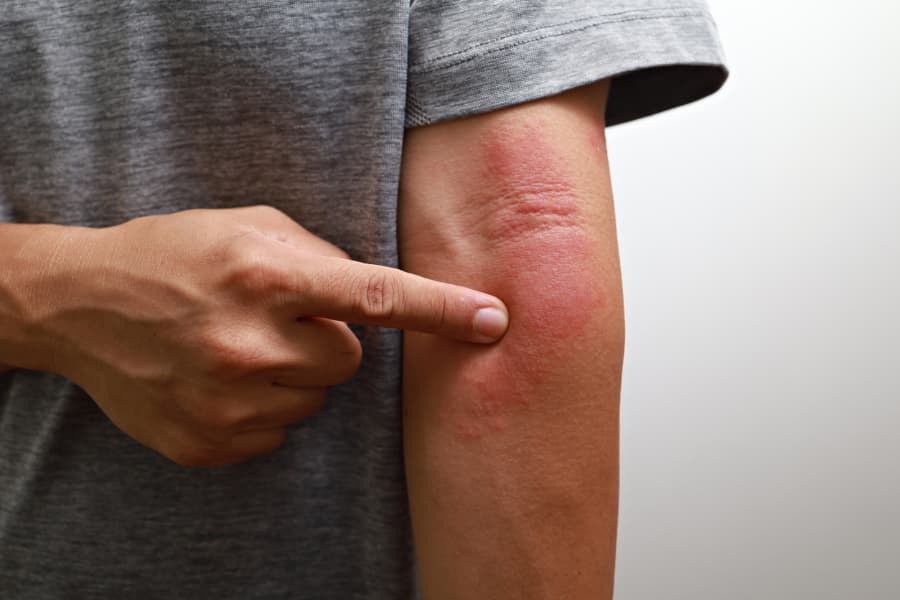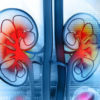Eczema Treatment in Northern New Jersey
 There are several different types of eczema, and effectively managing the condition depends on an accurate diagnosis and customized treatment plan. For those experiencing signs of eczema and interested in eczema treatments, help is available through the allergy and immunology specialists at Bergen Medical Associates. We offer many medical specialties for patients in northern New Jersey.
There are several different types of eczema, and effectively managing the condition depends on an accurate diagnosis and customized treatment plan. For those experiencing signs of eczema and interested in eczema treatments, help is available through the allergy and immunology specialists at Bergen Medical Associates. We offer many medical specialties for patients in northern New Jersey.
What Is Eczema?
Eczema is a group of inflammatory skin conditions characterized by dry, itchy, and inflamed skin. There are seven different types of eczema:
- Atopic dermatitis: The most common type, featuring dry, itchy, and inflamed skin
- Contact dermatitis: An itchy rash caused by direct contact with a substance
- Dyshidrotic eczema: small blisters on the palms of hands, soles of the feet, or edges of the fingers and toes
- Hand eczema: Mainly affects the palms, but may affect other parts of the hands as well
- Nummular eczema: Causes sound spots on the skin
- Seborrheic dermatitis: Mainly affects the scalp
- Stasis dermatitis: Caused by poor blood circulation, generally in the legs
Eczema affects over 31 million Americans, and the condition tends to be long-lasting and often results in flare-ups. It is most common in young children but can affect people of any age. The chronic condition is not contagious but can be irritating, especially for people with sensitive skin.
If someone suffers from eczema, they may be more likely to have allergic asthma and hay fever. People with eczema are even more likely to develop food allergies. Using moisturizing creams and lotions can help relieve some of the symptoms of atopic dermatitis and prevent future flare-ups. However, always consult with your physician before starting any new products or treatments.
What Are the Symptoms of Eczema?
There are many signs and symptoms of eczema, but these won’t be the same from person to person. Some may experience one or two of the symptoms, while others may experience all of them. The severity will also vary widely. Symptoms commonly associated with eczema are:
- Dry and cracked skin
- Itchy skin
- Swollen skin with a rash
- Tiny, raised bumps (on brown or black skin)
- Thickening of the skin
- Oozing and crusting
- Raw skin from scratching
- Darker skin (if around the eyes)
While eczema can often be simply irritating, it’s important to keep an eye on the symptoms. If discomfort is disrupting daily life, persists after home remedies, or is accompanied by pus or yellow scabs that may indicate a skin infection, one should meet with a doctor or skincare specialist. If your child has a fever or an infected rash, it’s best to seek medical attention right away.
What Are the Causes and Risk Factors for Eczema?
Eczema can be caused by a variety of factors, but atopic dermatitis is often caused by an overactive immune system. This makes the skin’s barrier unable to provide adequate protection against allergens, bacteria, and other environmental factors. It also leaves the skin dry and itchy because it can’t hold in moisture. Eczema can also be caused by the skin having too much of the bacteria Staphylococcus aureus, which takes the place of other helpful bacteria that protect the skin.
People with a family history of eczema may be at a higher risk of getting it themselves. Another risk factor is one’s home or work environment as certain items may increase flare-ups, including fabrics like wool or polyester, fragrances in candles, laundry detergents with chemical additives, disinfectants, dust mites, and more.
What Eczema Treatments Are Available?
Before treatment, doctors will diagnose patients to rule out other potential diseases. A doctor will discuss medical history and perform a physical exam. They may even recommend a patch test, where they will apply different substances to the skin and check to see how the skin reacts.
Basic treatments involve everyday moisturizers but may require medicated creams, gels, and ointments to help prevent itching, allowing the skin to heal. Another treatment a doctor may consider is prescribing antibiotics. This is generally used to help treat an infection.
If a case is severe, prescription pills may be called on. Medications can be used to help control symptoms for a short period. One could also receive injectable biologics if other treatments don’t work.
Some turn to therapies, including wet dressings and light therapy to reduce symptoms. Doctors may also recommend behavior modification to help stop a patient’s habit of scratching.
Look to Bergen Medical Associates for Eczema Treatment
Skin conditions can be irritating and leave us feeling uncomfortable in our own skin. That’s why those suffering from eczema should consider turning to medical professionals like those at Bergen Medical Associates. Our team of board-certified doctors is knowledgeable and friendly, which has helped us create a great reputation in northern New Jersey. Patients will feel confident, knowing they can turn to Dr. Margaret Co and our other healthcare experts if they need help. If you are interested in any of our treatments or have any questions, contact us today at one of our convenient locations.










